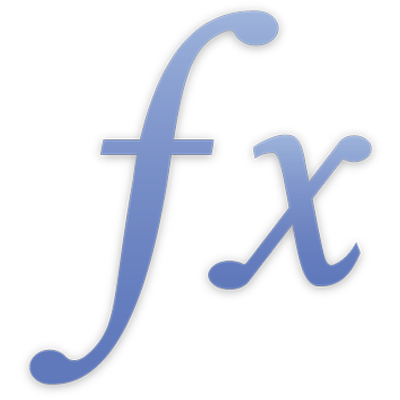Formulas and Functions Help
- Welcome
-
- ACCRINT
- ACCRINTM
- BONDDURATION
- BONDMDURATION
- COUPDAYBS
- COUPDAYS
- COUPDAYSNC
- COUPNUM
- CUMIPMT
- CUMPRINC
- CURRENCY
- CURRENCYCODE
- CURRENCYCONVERT
- CURRENCYH
- DB
- DDB
- DISC
- EFFECT
- FV
- INTRATE
- IPMT
- IRR
- ISPMT
- MIRR
- NOMINAL
- NPER
- NPV
- PMT
- PPMT
- PRICE
- PRICEDISC
- PRICEMAT
- PV
- RATE
- RECEIVED
- SLN
- STOCK
- STOCKH
- SYD
- VDB
- XIRR
- XNPV
- YIELD
- YIELDDISC
- YIELDMAT
-
- ABS
- CEILING
- COMBIN
- EVEN
- EXP
- FACT
- FACTDOUBLE
- FLOOR
- GCD
- INT
- LCM
- LN
- LOG
- LOG10
- MDETERM
- MINVERSE
- MMULT
- MOD
- MROUND
- MULTINOMIAL
- MUNIT
- ODD
- PI
- POLYNOMIAL
- POWER
- PRODUCT
- QUOTIENT
- RAND
- RANDARRAY
- RANDBETWEEN
- ROMAN
- ROUND
- ROUNDDOWN
- ROUNDUP
- SEQUENCE
- SERIESSUM
- SIGN
- SQRT
- SQRTPI
- SUBTOTAL
- SUM
- SUMIF
- SUMIFS
- SUMPRODUCT
- SUMSQ
- SUMX2MY2
- SUMX2PY2
- SUMXMY2
- TRUNC
-
- ADDRESS
- AREAS
- CHOOSE
- CHOOSECOLS
- CHOOSEROWS
- COLUMN
- COLUMNS
- DROP
- EXPAND
- FILTER
- FORMULATEXT
- GETPIVOTDATA
- HLOOKUP
- HSTACK
- HYPERLINK
- INDEX
- INDIRECT
- INTERSECT.RANGES
- LOOKUP
- MATCH
- OFFSET
- REFERENCE.NAME
- ROW
- ROWS
- SORT
- SORTBY
- TAKE
- TOCOL
- TOROW
- TRANSPOSE
- UNION.RANGES
- UNIQUE
- VLOOKUP
- VSTACK
- WRAPCOLS
- WRAPROWS
- XLOOKUP
- XMATCH
-
- AVEDEV
- AVERAGE
- AVERAGEA
- AVERAGEIF
- AVERAGEIFS
- BETADIST
- BETAINV
- BINOMDIST
- CHIDIST
- CHIINV
- CHITEST
- CONFIDENCE
- CORREL
- COUNT
- COUNTA
- COUNTBLANK
- COUNTIF
- COUNTIFS
- COVAR
- CRITBINOM
- DEVSQ
- EXPONDIST
- FDIST
- FINV
- FORECAST
- FREQUENCY
- GAMMADIST
- GAMMAINV
- GAMMALN
- GEOMEAN
- HARMEAN
- INTERCEPT
- LARGE
- LINEST
- LOGINV
- LOGNORMDIST
- MAX
- MAXA
- MAXIFS
- MEDIAN
- MIN
- MINA
- MINIFS
- MODE
- NEGBINOMDIST
- NORMDIST
- NORMINV
- NORMSDIST
- NORMSINV
- PERCENTILE
- PERCENTRANK
- PERMUT
- POISSON
- PROB
- QUARTILE
- RANK
- SLOPE
- SMALL
- STANDARDIZE
- STDEV
- STDEVA
- STDEVP
- STDEVPA
- TDIST
- TINV
- TTEST
- VAR
- VARA
- VARP
- VARPA
- WEIBULL
- ZTEST
- Copyright and trademarks

MATCH
The MATCH function returns the position of a value within a collection.
Tip: For an enhanced search that works in any direction, use XMATCH.
MATCH(search-for, search-where, matching-method)
search-where: The collection containing the values to be searched. search-where can contain any values.
matching-method: An optional modal value specifying how value matching is performed.
find largest value (1 or omitted): Find the cell with the largest value less than or equal to search-for. If you use find largest value, you can’t use wildcards in search-for.
find value (0): Find the first cell with a value that exactly matches search-for. This matching method is best for locating text. If you use find value, you can use wildcards in search-for. You can use a ? (question mark) to represent one character, an * (asterisk) to represent multiple characters, and a ~ (tilde) to specify that the following character should be matched rather than used as a wildcard.
find smallest value (–1): Find the cell with the smallest value greater than or equal to search-for. If you use find smallest value, you can’t use wildcards in search-for.
Notes
MATCH works only on a collection that is part of a single row or column; you can’t use it to search a two-dimensional collection.
Cell numbering starts with 1 at the top or left cell for vertical and horizontal collections, respectively. Searches are performed top-to-bottom or left-to-right.
When searching for text, case is ignored.
Examples |
|---|
Given the following table: |
A | B | C | D | E | |
|---|---|---|---|---|---|
1 | 10 | vel | 40 | ||
2 | 20 | elit | 20 | ||
3 | 30 | lorex | 30 | ||
4 | 40 | felis | 50 | ||
5 | 50 | facit | 10 |
=MATCH(40, A1:A5) returns 4, because 40 (search-for) is the fourth item in the specified collection (search-where). =MATCH(40, E1:E5) returns 1, because 40 is the first item in the specified collection. =MATCH(35, E1:E5, 1) returns 3, because 30 is the largest value less than or equal to 35 (matching-method is 1, find largest value). =MATCH(35, E1:E5, -1) returns 1, because 40 is the smallest value greater than or equal to 35 (matching-method is -1, find smallest value). =MATCH(35, E1:E5, 0) returns an error, because no exact match can be found (matching-method is 0, find value). =MATCH("vel", C1:C5) returns 1, because "vel" appears in the first cell of the specified range. =MATCH("*x", C1:C5, 0) returns 3, because "lorex", which ends with an "x", appears in the third cell of the range. =MATCH("vel", C1:D5) returns an error, because the search-for collection can only include one row or one column. =MATCH(REGEX("^f.*"), C1:C5,0) returns 4, because the first word that starts with an "f" is the fourth item in the collection. |